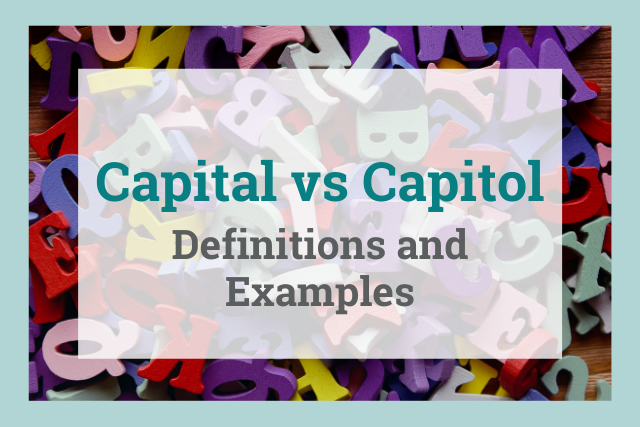
Capital. Capitol. Two words. Seven definitions. That’s a whole lot of meanings to choose a spelling for. So how do you keep them apart?
For starters, read this guide. It’s going to walk you through all seven definitions and give you examples and tips about how to remember which spelling matches which definition.
A Brief Explanation of Homophones
Before we get into the definitions, let’s first talk about the confusing existence of words like capital and capitol. They are pronounced exactly the same, yet for some reason they aren’t spelled the same. So what’s up with that?
Homophones are words that sound alike but have different spellings and meanings.
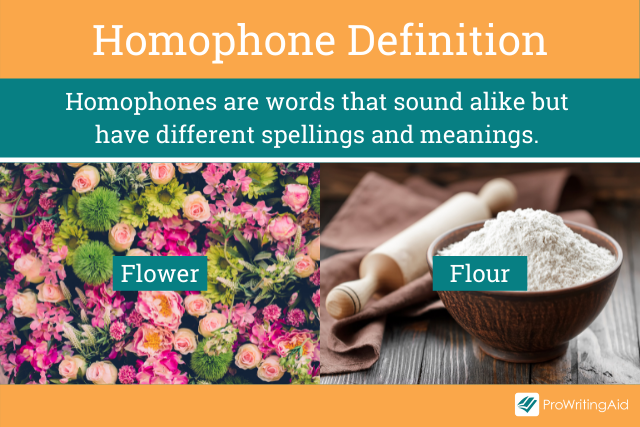
Along with capital and capitol, here are some more examples:
Too, to, two
Their, they’re, there
Sea, see, cee
Wait, weight
Cellar, seller
Basically, they are the words that people will tease you about misusing in a social media post. This isn’t a post that goes into the history of homophones or why they exist. However, knowing this is a good start to a discussion on the difference between capital and capitol. With that, let’s start defining!
Capital vs. Capitol: Capital
Let’s start with the word capital because it is the most common. If you are ever in doubt, go with capital with an A because you have a 5/7 chance of being right. Of course, you want to be right 7/7 times, so let’s get more specific.
Capital Definition 1: The Main City
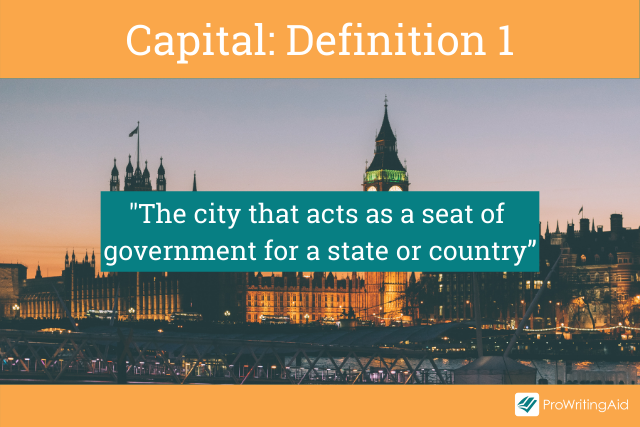
If you ever had to learn each nation's capital in elementary school, then you should be aware that countries and states have a capital city. That’s capital with an A.
Think of Atlanta or Amsterdam. Both of these are capitals.
I picked these two examples on purpose because I want to use them as a tip for how to remember this spelling: If you tend to forget this one, just associate it with a capital city that you know well that starts with an A.
I live in Atlanta, so that’s an easy one for me. However, there are plenty of other A capitals, too. Just create your own mnemonic device.
This is mine: Atlanta, sometimes called the Big A, is the capital of Georgia, which is spelled with an A.
Now let’s go over some examples:
I have always wanted to go to Paris, the capital of France.
Have you ever visited Phoenix, the capital of Arizona?
Did you know that Juneau is the capital of Alaska?
I have been to the capital of Japan, which is Tokyo.
Each country only has one capital city.
Capital Definition 2: Money, Money, Money
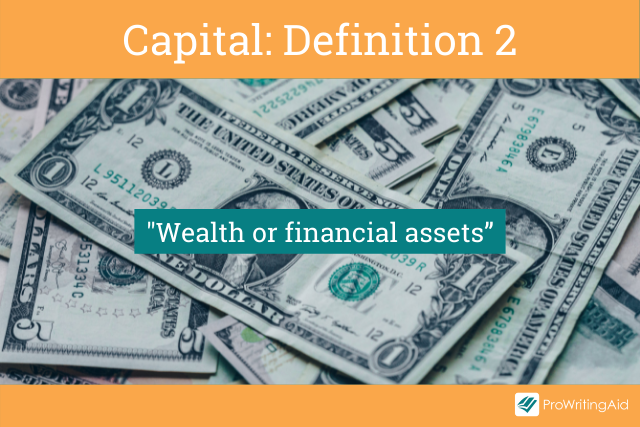
Capital can also refer to wealth or other financial property. How much capital a company or a nonprofit or even an individual has shows how financially stable they are. You might hear that a nonprofit is having a capital campaign to raise funds. You might also hear that a company has X amount of capital to spend.
Here are some examples:
I can’t go out tonight because I don’t have enough capital on me.
The fundraiser was a success, and they raised enough capital to build the new shelter.
If you are thinking of buying that company, you should probably know how much capital they have on hand.
The richest man in town must have a lot of capital.
The company went under after they lost all of their capital.
I again like to remember this one by creating a very A-filled phrase.
“How can I have an A+ night? Cash, capital, cha-ching!”
It’s a little cheesy, but it works!
Capital Definition 3: Death, the Capital Punishment
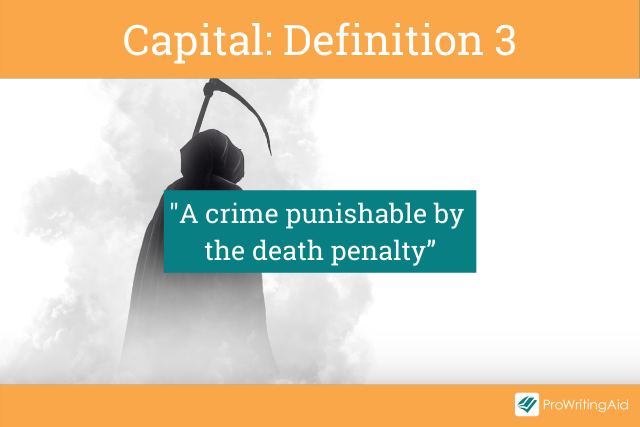
Of all the definitions in this list, this one is the most serious and final: capital crimes, aka crimes that could lead to the death penalty.
Whether you are pro-capital punishment or not isn’t the issue right now because both sides spell it the same way, with an A before the l.
I don’t have any good mnemonic devices for this one, but what helps me to remember is combining it with the next definition (on capital letters) because I know that this is serious.
Getting a capital punishment and being sentenced to death means that something bad happened, all caps BAD.
Let’s look at some examples:
The serial killer was sentenced to capital punishment.
Murder is a capital crime punishable by death.
He didn’t kill anyone, so capital punishment isn’t an option.
We should get rid of all capital punishment to make sure no innocent person is put to death.
If capital punishment was eradicated, would crime rise?
Capital Definition 4: The ABCs of Uppercasing
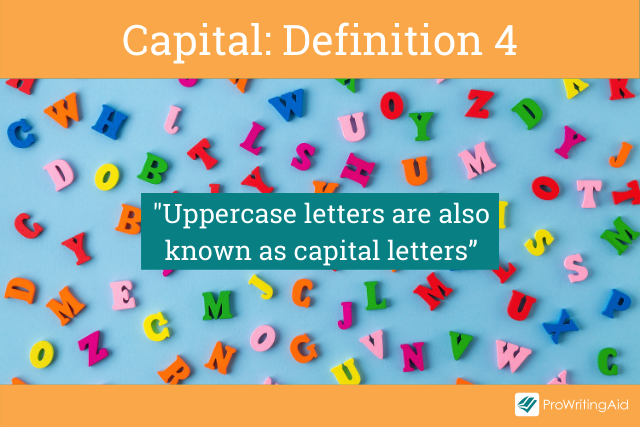
Remember this old joke: What’s the capital of Minnesota?
M.
That’s right. We’ve come to the definition of capital that you are likely most familiar with. When you put an uppercase letter on a word, you are capitalizing the word, which means that an uppercase letter is a capital letter.
You tend to capitalize the first word of a sentence, most words in a title, and proper names (like names or places).
So here is an easy way to remember this one: You know to capitalize the first word of a sentence, and A is the first letter of the alphabet. So always use it to put a capital at the start.
I know this is likely an easy one for you, but let’s go through some examples just in case:
The capital letter in this sentence is a T.
Make sure that Vermont starts with a capital V.
Have you ever seen a title that doesn’t include any capital letters?
You put a capital letter at the start of every word in a title except for articles, conjunctions, and prepositions.
Are you mad at me? Because you keep typing everything in all capital letters!
Capital Definition 5: Isn’t it Wonderful?!
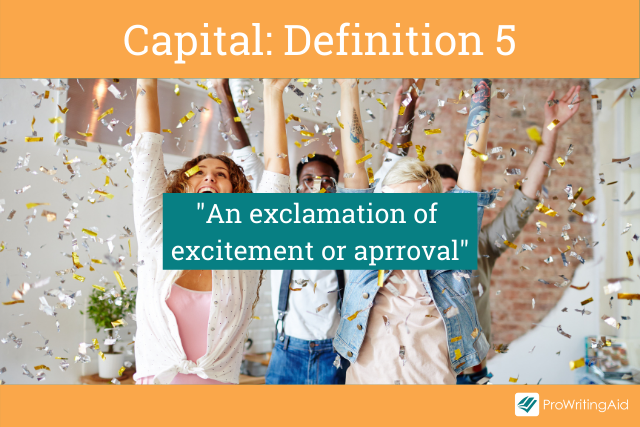
Of all the definitions of capital, this one is my favorite and also the most old-fashioned and least frequently used. I don’t know if it is actually a British word, but it has always felt very British to me at any rate. What is it?
It’s wonderful. I mean, it’s capital. To clarify, capital can be an exclamation of excitement or approval.
The best tip I can give you is once again to remember how the word capital is spelled when it comes to capital letters. That’s because capital as an exclamation is often (but not always) its own sentence, so it would then start with a capital C.
Here are some examples:
You got the job?! Capital!
I’m so happy you loved the trip! That’s capital!
How are you today? Splendid! Capital!
Did you get all of these? I hope so because it's time to mix it up by adding in some more definitions, this time with an alternate spelling.
Capital vs. Capitol: Capitol
While it is easy to just remember that most definitions of capital vs. capitol go with the A-version of the word, just using that spelling for everything can be embarrassing if you happen to be talking about our next two definitions. Let’s go over the final two definitions so that this never happens to you.
Lower-case Capitol: A Capitol Building
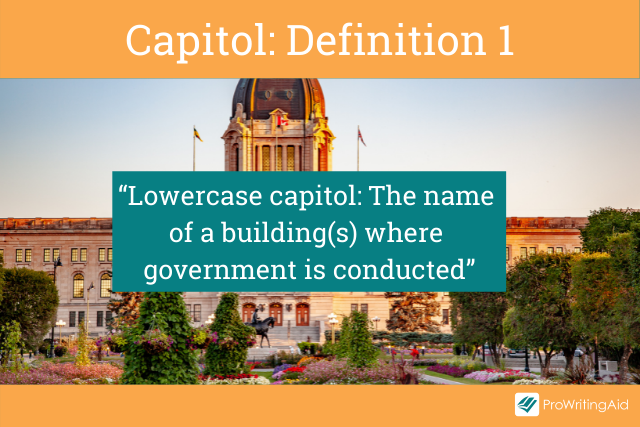
The first definition of capitol with an O are the buildings in which state government is conducted. So going back to Atlanta, I often drive by the state capitol building, which is known for its gold dome (a common feature of many capitol buildings).
This might be one that you just have to memorize, but here is something that may help you remember the spelling:
Capitol buildings can be very fancy, so they often have gold domes like the one I mentioned in Atlanta. So think of a gold dome capitol.
Let’s see some examples:
The capitol building is very pretty.
The governor works in the capitol building.
Our class went on a field trip to the capitol building.
The capitol building was first constructed in 1892.
The capitol building has a lot of security.
Upper-Case Capitol: A Specific Building
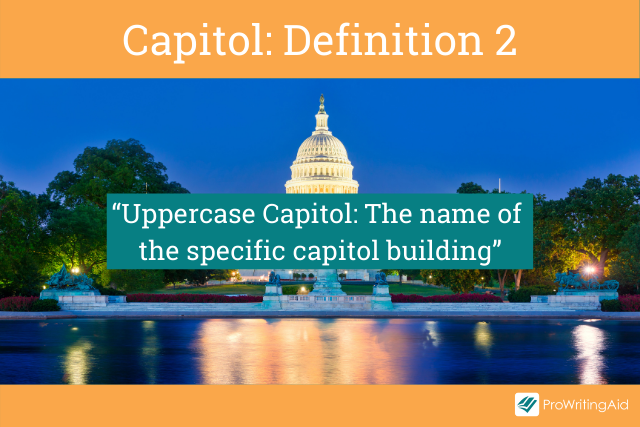
Technically, I am cheating here. There are two definitions within this one definition I am about to give you:
When Capitol is capitalized (confusing, I know) it is referring to a specific state capitol building. For example, “the West Virginia State Capitol.”
However, if it is capitalized and it isn’t clear which building it is referring to, then it means the building in the United States where congress meets to legislate.
So if someone tells you they are going to the Capitol, you know they mean the building in Washington D.C.
It is often used as part of a noun phrase in which other things related to the Capitol are being discussed. For example, consider the following:
Capitol police, officers who work in the Capitol building
Capitol Hill, the combined buildings in which the U.S. government is conducted
Capitol building, the building where they work
Here is a way to remember this spelling: The president has the Oval Office. Congress has the Capitol building.
Is Washington D.C. the Capital or Capitol?
We’ve now covered all of the many definitions of these two homonyms. However, there is still something really confusing that we should cover: Washington D.C.
Washington D.C. is the capital city of the United States. Just like all capital cities, then, it uses the A version of the word. However, D.C. is also where the Capitol building is, which means you could go to the capital to see the Capitol.
Technically, this is true of all (or at least most) state capitol buildings since generally state government work is done in the capital city.
Florida’s capitol building is located in the state capital, Tallahassee.
Idaho’s capitol building is located in the state capital, Boise.
Australia’s parliament meets on their Capitol Hill in their capital, Canberra.
So it can be confusing.
That’s okay. Just remember all of the tips that I gave above.
If you can remember that capitol always refers to a building of some sort, then the rest becomes easy. D.C. is a city, not a building, so it cannot be a capitol, it must be a capital.
On the other hand, the State Capitol building is a, well, building, so it must have an O.
That’s really all it comes down to at the end of the day: O for Gold Dome Buildings, and A for All Additional Definitions.
A Simple Trick to Know the Difference
There is a lot to remember, of course, with seven definitions. That is where ProWritingAid comes into the equation. Along with pointing out places where you might have used the incorrect homophone, you can also double check with the homophone report to see how you are doing.
Here is an article that will walk you through how to use the homophone report feature.
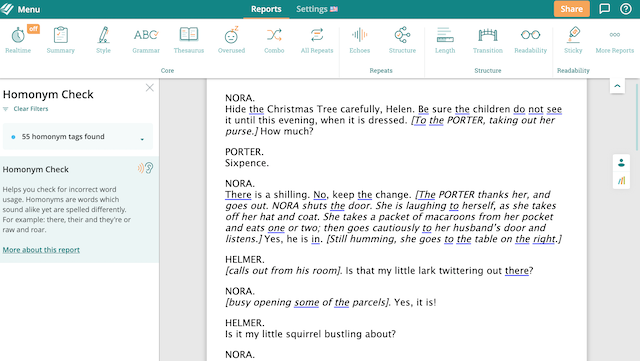
Thanks for reading; it’s been capital to help you out today.


